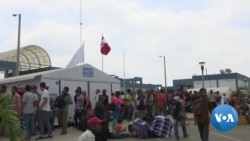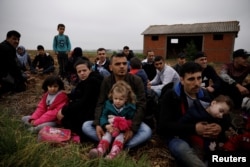The U.N. refugee agency reports nearly 71 million people around the world are now forcibly displaced by war, persecution and conflict. This is the highest level ever reached since the UNHCR was established nearly 70 years ago. The report comes ahead of World Refugee Day on June 20.
The U.N. refugee agency calls the 70.8 million figure conservative because the Venezuelan crisis is not factored in. The agency explains some 4 million Venezuelans have fled their country, but very few have formally applied for asylum. Therefore, they are not counted in the refugee statistics.
Last year, the report says war and strife forced nearly 26 million people, half of them children, to flee their countries and become refugees. More than 41 million more people were internally displaced, fleeing their homes, but staying inside their own nations.
It says more than two-thirds of all refugees worldwide come from just five countries—Syria, Afghanistan, South Sudan, Myanmar, and Somalia.
For the fifth consecutive year, the report says Turkey hosted the largest number of refugees, followed by Pakistan, Uganda, Sudan and Germany. U.N. High Commissioner for Refugees, Filippo Grandi, says an analysis of the statistics shows that wealthy countries do not shoulder the greatest refugee burden.
“When you say Europe has a refugee emergency or the United States or Australia—No. Most of the refugees are in fact in the countries next to where the war is and, unfortunately, that means in mostly in poor countries or in middle-income countries. That is where the crisis is. That is where we need to focus,” Grandi said.
High Commissioner Grandi tells VOA Sub-Saharan Africa continues to be a place of old, recurrent and new conflicts.
“Old—take Somalia for example. Recurrent—take Burundi or DRC, South Sudan, the most recurrent of all. New—take the situation in the Anglophone parts of Cameroon, for example. This is relatively new. There are 30,000 Cameroonian refugees in Nigeria and there is a large number of Cameroonians displaced inside their country,” Grandi said.
Grandi says refugees would like to go home. Unfortunately, he says they are forced to live in a state of limbo for longer and longer periods of time. This is because finding durable solutions for their plight is becoming increasingly difficult.
He says new conflicts producing new refugees are arising faster than solutions can be found for the people who are displaced. Of the more than 70 million people who were displaced in 2018, the UNHCR reports slightly less than 600,000 refugees were able to return home, while only 92,400 were resettled in third countries.






